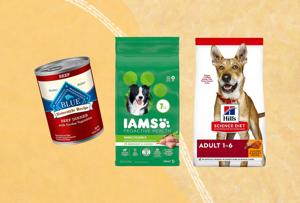Best Food for Quiet Puppies: Top Nutrition Tips
When it comes to our quiet puppies, we want to provide them with the best nutrition to support their tranquil demeanor and optimal health. Choosing the right food for our serene companions is essential to ensure their well-being and happiness. In this article, we will explore some top nutrition tips for selecting the best food for our calm and well-behaved puppies.
Key Takeaways:
- Choosing the right food is crucial for the overall well-being of our quiet puppies.
- Opt for top-rated puppy food that provides all the essential nutrients for a calm demeanor.
- A nutritious diet is key to supporting the health and vitality of our young dogs.
- Consider premium dog food options that promote tranquility and peaceful behavior.
- Ensure the food you choose offers the optimal combination of ingredients for your quiet puppy’s needs.
Importance of Slowly Transitioning Puppy Food.
When it comes to changing your puppy’s food, a gradual transition is key to ensuring their tummy adjusts smoothly. Abruptly switching their food can lead to digestive issues and discomfort. To make the transition easier for your furry friend, it’s important to follow a step-by-step process.
Begin by mixing a small amount of the new food into their current food. Start with a ratio of 1:4, with the majority being their regular food. Over the course of 7-10 days, gradually increase the proportion of the new food while decreasing the old food. This slow introduction allows your puppy’s digestive system to adapt to the change.
This method is especially crucial when transitioning between wet and dry food. Wet food has a higher moisture content, while dry food is more concentrated. Switching between these two textures requires a gradual adjustment to avoid upsetting your puppy’s digestive system.
During the transition period, keep a close eye on your puppy’s tummy. Look for any signs of digestive discomfort, such as diarrhea or vomiting. If you notice any issues, slow down the transition process and give their tummy more time to adjust. It’s always better to take it slow and ensure a smooth transition for your furry friend.
Nutritional Needs for Different Puppy Sizes.
When it comes to raising a happy and healthy puppy, providing them with the right nutrition is essential. However, the nutritional needs of puppies can vary based on their size. In this section, we will explore the specific requirements for large breed puppies, toy and small breed puppies, and medium breed puppies.
Large Breed Puppies

Large breed puppies have unique dietary needs due to their rapid growth and potential joint problems. To support their muscle development and overall health, it’s important to choose a puppy food that meets their specific requirements.
| Nutrient | Percentage |
|---|---|
| Protein | Approximately 26% |
| Fat | 15% |
| Calcium | 1.1-1.8% |
| Calories | Varies based on age and activity level |
The high protein content, around 26 percent, helps support their muscle development. Additionally, a controlled fat level of 15 percent helps prevent excessive weight gain and supports healthy growth. Adequate calcium levels, ranging from 1.1 to 1.8 percent, are crucial for proper bone and joint development in large breed puppies. Lastly, calorie requirements will vary based on the puppy’s age and activity level.
Toy and Small Breed Puppies
Toy and small breed puppies have their own set of nutritional considerations. Due to their small size and higher metabolism, they are at risk of hypoglycemia (low blood sugar levels) if they go too long without eating. Therefore, it’s important to establish a feeding schedule that includes frequent meals throughout the day.
While there are no specific protein or fat percentage requirements for toy and small breed puppies, it’s generally recommended to choose a high-quality puppy food that provides balanced nutrition. Consult with your veterinarian to determine the appropriate food and feeding schedule for your specific puppy.
Medium Breed Puppies
Medium breed puppies, such as Border Collies or Bulldogs, fall between the large and toy/small breed categories when it comes to their nutritional needs. They generally have more flexibility in their dietary requirements and can be fed commercial dog foods formulated for medium-sized dogs.
When selecting a puppy food for medium breed puppies, it’s important to consider their age, activity level, and any specific health concerns. Opt for a balanced diet that provides the necessary nutrients for their growth and overall well-being.
Remember, each puppy is unique, and it’s always beneficial to consult with your veterinarian to determine the most suitable food and feeding guidelines for your puppy’s specific size and breed.
Conclusion
Managing your puppy’s food and ensuring they maintain a healthy weight are essential for their overall health and well-being. It’s important to avoid falling for fad diets and instead focus on providing them with high-quality, age-appropriate, and size-appropriate food.
By choosing a balanced and nutritious diet for your puppy, you can help prevent obesity and promote optimal growth and development. Regularly monitoring your puppy’s weight and body condition is a crucial part of their healthcare routine.
Remember, a healthy weight plays a significant role in your puppy’s long-term health and behavior. Maintaining the right nutrition and weight can foster a happy and well-behaved companion.
FAQ
How should I transition my puppy’s food?
When changing your puppy’s food, it’s important to do so slowly. Gradually introduce the new food by mixing a small amount into their current food and gradually increasing the proportion of the new food over the course of 7-10 days. This helps their tummy adjust and prevents digestive issues.
Is there a specific feeding schedule for small breed puppies?
Yes, toy and small breed puppies are at risk of hypoglycemia. To maintain their blood sugar levels, they should be fed frequent meals throughout the day. It’s important to ensure they have a steady source of energy to support their small bodies.
What are the nutritional needs for different sizes of puppies?
Large breed puppies require a puppy food with approximately 26 percent protein to support muscle development and 15 percent fat to prevent rapid growth and potential joint problems. Toy and small breed puppies have higher energy needs and should have a feeding schedule that accommodates their small size. Medium breed puppies generally have more flexibility in their dietary requirements and can be fed commercial dog foods formulated for medium-sized dogs.
How can I ensure my puppy is at a healthy weight?
Regularly check your puppy’s body condition to ensure they are at a healthy weight. Avoid fad diets and focus on feeding them high-quality food appropriate for their age and size. Proper nutrition and weight management are crucial for their overall health and well-being.








